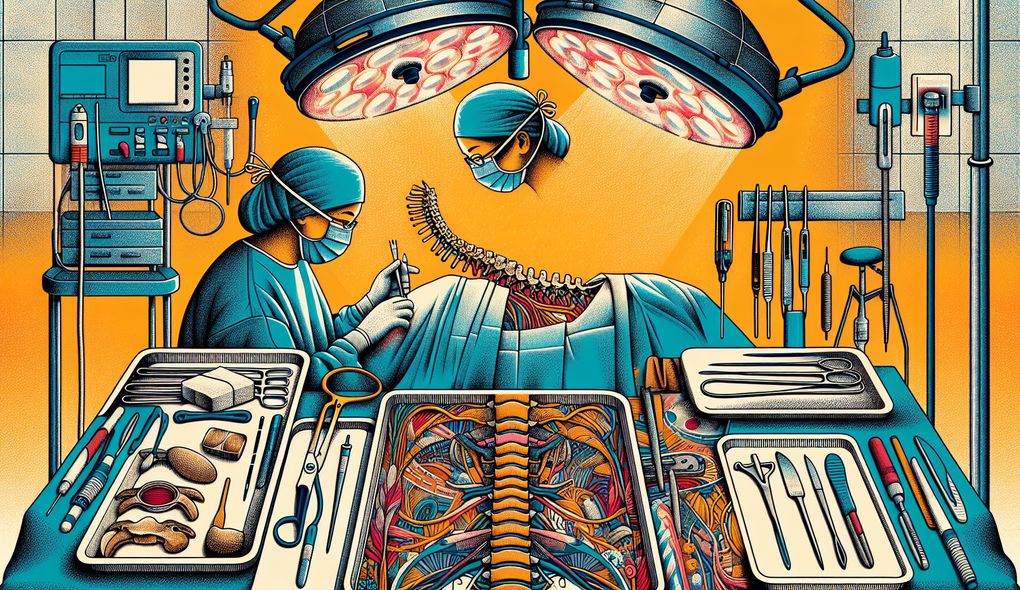Can you provide an example of a time when you had to make a critical decision during a surgical procedure?
JUNIOR LEVEL

Sample answer to the question:
During a surgical procedure, I had to make a critical decision when I encountered unexpected bleeding from a blood vessel. I quickly assessed the situation, determined the source of the bleeding, and applied direct pressure to control it. I coordinated with the surgical team to address the issue while ensuring patient safety. I then utilized advanced surgical techniques to repair the vessel and prevent further bleeding. This decision required me to think on my feet, stay calm under pressure, and rely on my years of training and experience. Overall, the patient had a successful outcome and recovered well.
Here is a more solid answer:
During a spinal fusion surgery, I encountered a challenging scenario where the patient's bone density was lower than expected. This posed a significant risk for the integrity of the spinal instrumentation. In that moment, I had to make a critical decision to modify the surgical approach to ensure the long-term stability of the fusion. I collaborated closely with the surgical team, including the anesthesiologist, to discuss alternative options and mitigate any potential complications. Drawing upon my extensive knowledge and experience in spine surgery, I determined the best course of action, which involved using a combination of specialized implants and strategic bone grafting techniques. This decision required precise hand-eye coordination and excellent manual dexterity to execute the modified approach. The outcome was successful, with the patient achieving a solid fusion and experiencing significant relief from their symptoms. Reflecting on this experience, I recognized the importance of continuous professional development to stay abreast of the latest advancements in spinal surgery techniques and implant technologies. I regularly attend conferences and participate in educational courses to enhance my skills and ensure the highest quality of care for my patients.
Why is this a more solid answer?
The solid answer provides a more detailed example of a critical decision made during a surgical procedure. It includes specific details about the challenges faced, the collaborative approach taken, and the candidate's expertise in spine surgery. Additionally, it highlights the importance of continuous professional development. However, it can still be improved by providing more specific information about the alternative options considered and the patient's post-operative outcome.
An example of a exceptional answer:
During a complex spinal decompression surgery, I encountered an unexpected complication when a nerve root was inadvertently damaged during the procedure. Instantly recognizing the severity of the situation, I quickly decided to halt the surgery to prevent further harm. I immediately collaborated with the anesthesiologist to ensure the patient's stability and optimize pain management. Furthermore, I engaged in frank communication with the patient and their family, fully explaining the situation, the potential implications, and the plan for immediate intervention to address the nerve injury. Drawing upon extensive experience in nerve repair and preservation techniques, I performed an emergent nerve exploration and repair procedure, restoring the nerve function to its optimal state. This decision demanded exceptional critical thinking and problem-solving skills, as well as the ability to remain calm under immense pressure. Post-operatively, the patient made a remarkable recovery, regaining full function and experiencing significant pain relief. Reflecting on this critical decision, I realized the importance of continually honing my skills through participation in specialized workshops, hands-on training, and peer-reviewed literature. Staying at the forefront of surgical techniques and medical advancements is a commitment I uphold to ensure ethical and high-quality care for my patients.
Why is this an exceptional answer?
The exceptional answer goes above and beyond by providing a highly detailed example of a critical decision made during a surgical procedure. It includes specific details about the complications faced, the collaboration with other healthcare professionals, and the impact of the decision on the patient's outcome. It also highlights the importance of continuous professional development and ethical medical practice. This answer effectively demonstrates the candidate's exceptional critical thinking, problem-solving skills, and commitment to patient care.
How to prepare for this question:
- Reflect on past surgical experiences and identify moments when critical decisions had to be made.
- Research and stay updated on the latest advancements in spine surgery techniques and technologies.
- Practice explaining complex surgical procedures and decisions in a clear and concise manner.
- Demonstrate a strong commitment to ethical medical practice during the interview.
- Highlight experiences or examples that showcase collaborative skills in a high-pressure environment.
What are interviewers evaluating with this question?
- Strong foundation in surgical techniques and patient care
- Excellent hand-eye coordination and manual dexterity
- Exceptional critical thinking and problem-solving skills
- Ability to work collaboratively in a high-pressure environment
- Commitment to ethical medical practice and continuous professional development

